We were at the pediatrician for our baby boy’s well-check. Because we were first-time parents, my husband came to every appointment.
With each visit, we had a ton of questions. We wanted to make sure our little guy was hitting the appropriate developmental milestones.
The doctor walked in. Before she could slide across the floor on her rolly stool, she started going through her checklist.
He’s (finally) at a great weight and almost off the charts for height. Phew. Is he sleeping at least 11 hours at night? Does 13 count? Does he have a well-balanced diet? Check. He should start toilet training within the year. Sticker charts work great for this. Got it. Is he active? Oooooh yes! Does he understand commands? Yeppers.
We were feeling pretty thankful for our healthy little guy.
I can’t remember everything she said. I only recall her ending our little talk with how we should be praising him at least 20 times a day. My husband and I looked at each other beaming with pride. We praised him at least triple that number PER day and the charts were already purchased.
He was going to be the most successful kid on the planet.
Or so we thought.
This post may contain affiliate links, see disclosure policy for details.

Fast forward six years later, my husband was getting
The host and Jessica started talking about how praise can deter kids from accomplishments. They started talking about extrinsic and intrinsic motivation. Names like Dan Pink, Alfie Kohn, and Dr. Carol Dweck were mentioned. Immediately, I made note of these books I now needed to read.
It was like I got hit by a hurricane.
Table of Contents
Did They Just Say Praise Was Bad?

Back. Up. The. Train.
I was in complete shock.
There was a cacophony of thoughts running through my mind…
I’m not supposed to praise my kid?
…but the doctor said…
How else are they going to be confident?
…but my kids need to know when they’re doing well. …Don’t they?
NOOOOOO…NOT THE STICKER CHARTS!
I MADE THEM LOOK SO PRETTY. They work so well! …Or I guess when we first started they did and as long as we kept changing them up.
But, but, but….
When I thought about how a child doesn’t need to be told a good job because when they do a good job it is self-evident, the puzzle was beginning to come together. Instead, a child needs to be told why what he did was a good job so he can continue to duplicate that behavior.
Their valid points made me thirsty for the results of all the research done on praise. And more importantly, how could we make the shift from turning our praise into everlasting encouragement?
I do have to say this shift has been incredibly difficult for me and especially my husband. We just can’t help but “good job” our kids to death.
Thankfully they’re still alive.
What has been put to death, however, are our sticker charts.
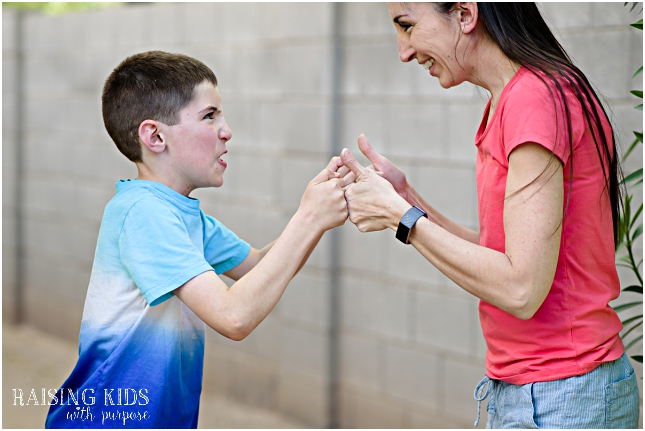
The Difference Between Praise and Encouragement:
To start, we need to establish that praise and encouragement are not necessarily the same thing.
Vicki Hoefle’s article on pbs.org provides a very thought-provoking definition of encouragement,
“It is an observation, an acknowledgment, a statement which focuses on effort, improvement of choice, and it helps to promote self-esteem and a sense of well-being, confidence, insight, and resilience.”
Whereas praise may leave us with nowhere to go when there is a similar situation resulting in a negative outcome.
Praise is typically a blank statement of opinion. According to the dictionary, the definition is, “The expression of approval or admiration for someone or something.” The word that should jump off the screen here is approval.
Do you see the difference? Do you see how praise could (oftentimes unintentionally) be detrimental to a child’s confidence? It can cause our kids to be dependent on our approval.
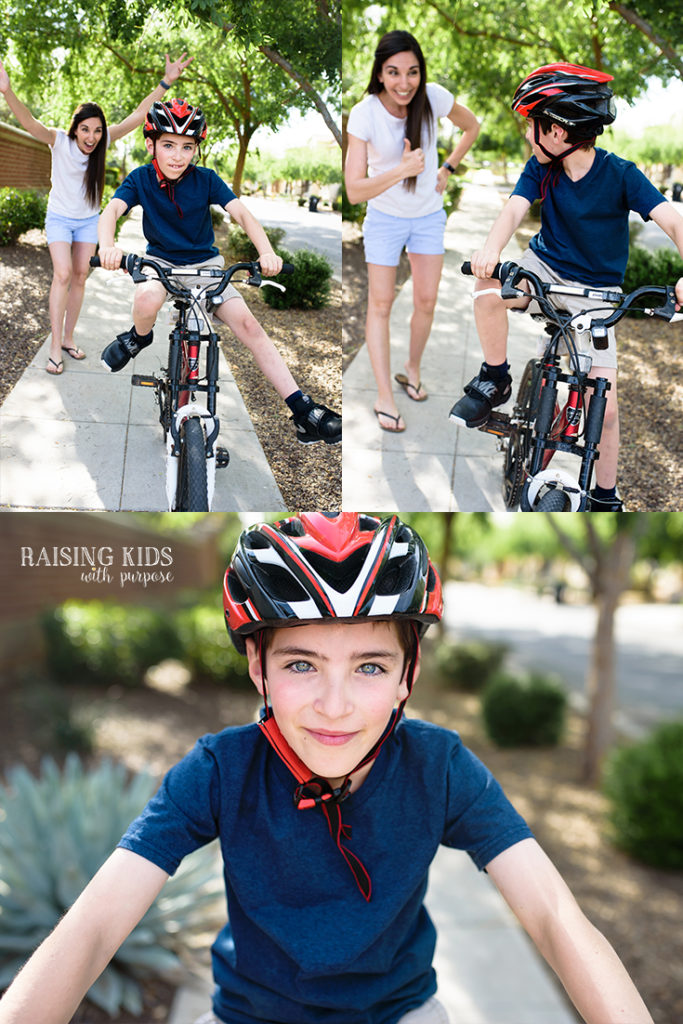
Not All Praise Is Bad
I have good news! We should still use positive communication with our kids but be intentional with the words we use.
In The Strength Switch by Dr. Lea Waters, she references a longitudinal study (this is research done over several years) conducted with late elementary to high school-age kids on the effects of positive communication.
Astoundingly, they found that low levels or the absence of positive communication had a greater risk of brain alterations. This led to kids being more susceptible to depression. The parents didn’t negatively talk to their kids, they simply didn’t use enough positive words or ideas when communicating with them.
Whereas, the kids who received high levels of positive communication had brain alterations that were associated with the enhancement of capacity for learning, decision-making, social skills, and emotional functioning. The types of positive communication that were used followed patterns that were approving, validating, affectionate, humorous, pleasant, and caring.
Doesn’t that make you want to do the latter?
Our words truly are POWERFUL! And something Dr. Waters says a few times in the book that has really stuck with me is, “Where attention goes, energy flows.”
Types of Praise
This was news to me. I thought praise was praise but actually, there are different types. You have probably guessed that some can be helpful and in more of the, ‘I’m here to encourage you’ camp, than the more damaging, ‘you need my approval’ camp.
Alfie Kohn says, “Clearly, it is worth reconsidering the use of praise if it turns out to be something we need to say more [for our benefit] than something they need to hear.”
Preach it, Alfie!
The goals of praise are related to performance, enjoyment, promoting appropriate behavior, and motivation.
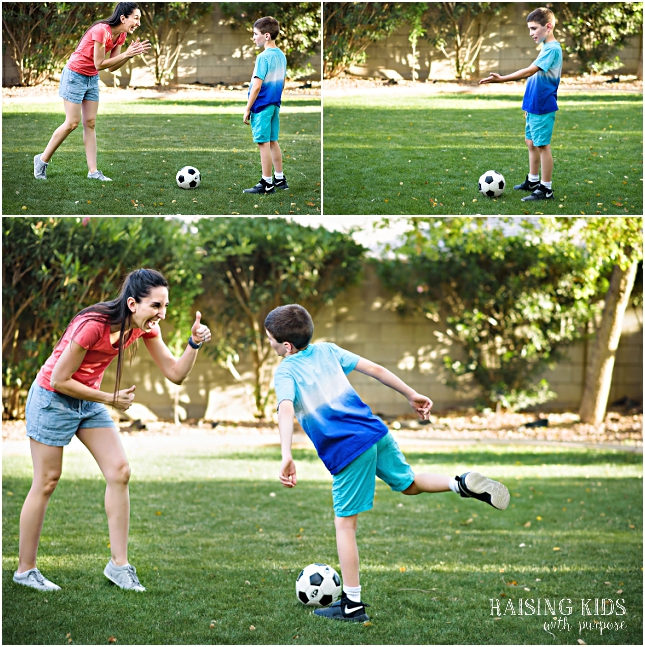
Generic Praise
These are generic positive statements like we mentioned above. This is what we’ve had no trouble at all doing in our house.
It includes “good job”, “way to go”, “awesome”, “great work”, etc.
The problem with this type of praise is that it’s not attached to what the child did that was good or beneficial so it’s harder for him or her to do the same thing with the same kind of success. It focuses on the outcome instead of the process.
The reason we use this type of praise is to reinforce good behavior. However, the research shows the reverse is true. We can be sending discouraging messages because they take away from the effort our kids are putting in. Rewarding expected behaviors comes off as judgment.
In “Unconditional Parenting“, Alfie Kohn uses the example of saying “good job” to a child who is swinging by making the point that, “It’s gravity, for goodness sake!”
Oh, I can’t even begin to tell you what we have
Person Praise
When the praise is directed at what the kid’s innate qualities are, this is called character or person praise. Examples include calling your child smart, responsible, helpful, or generous.
In Dr. Carol Dweck’s work on mindset, she has found that person-praise can lead to a fixed mindset regarding achievement.
In Carol Dweck’s findings:
- If children don’t hold up to the standard of what they’ve been called – smart, intelligent, etc., then they can’t see it objectively as to what they can improve upon. And instead, think the opposite is now true.
- Person praise typically leaves a person to not try as hard. He or she
tends to stay away from challenges to maintain that label. - It is a short-term feel-good tactic when they are succeeding, but it affects their resilience in a negative way when they face setbacks later in life.
In studies of person-praise at home, she has found that with praise specific to morals, kids do have the growth mindset that we want to encourage.
Just the other day, I pointed out to my son that he was being responsible. He packed for camping without me asking. Then during the trip, he pridefully got his pajamas ready for bed and repeated what I had told him earlier, “Look, mom! I’m being responsible again.” By pointing out what his actions are displaying, this encouraged him to continue with those behaviors.
Process Praise
This type of praise focuses on the actions of the child. It praises the child for his or her effort, improvement, technique, or strategy. It’s praising the behaviors we want to see again.
For achievement, this is the type of praise needed to cultivate a growth mindset. It makes our kids feel good about their choices, helps them see what it takes to be successful so they can do it again, and can develop optimism and resilience for future outcomes.
Kids can become competent by realizing what happens when they do something positive instead of being told about what happens.
The one thing we have to be cautious about this type of praise is with our perfectionist son. Because of his mentality, process praise can sometimes demotivate him like other kids whose core beliefs are this way.
>>Read more: How to teach your child a new skill
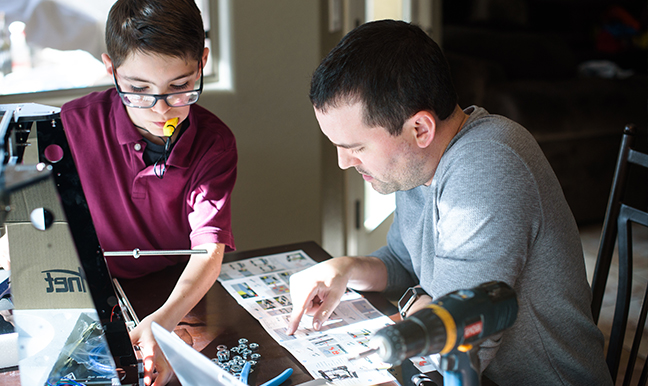
How to Use Praise That Encourages Kids
Lastly, praise which is a bit of a hybrid that Dr. Lea Waters developed is what she calls strength-based praise. Because it combines both person and process praise, it transforms your words into encouragement.
To do this, you praise both character strengths (person praise) and how the strengths were used (process praise). It can look like this:
“You were very responsible (PERSON) for packing your clothes by doing it all yourself without being asked (PROCESS). You used your ability to organize (STRENGTH) to get your clothes packed in time for our trip.”
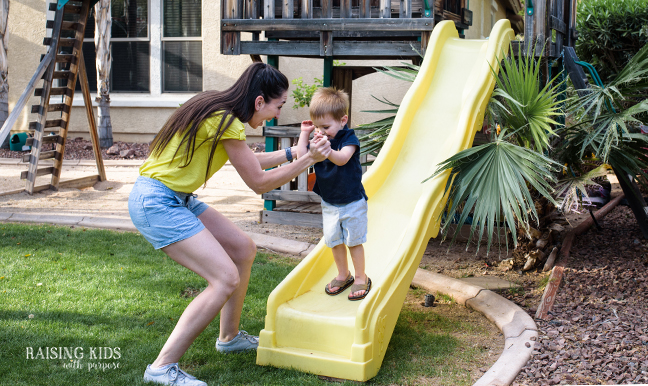
This Type of Encouragement:
- Acknowledges actions. This helps them understand what they did well so they can do it again.
- Acknowledges strengths such as ability, talent, skills, and positive personality traits to recognize the inner assets the child has brought to the situation. You’re showing your child how his strengths work, not just what they are.
“I believe this is because,
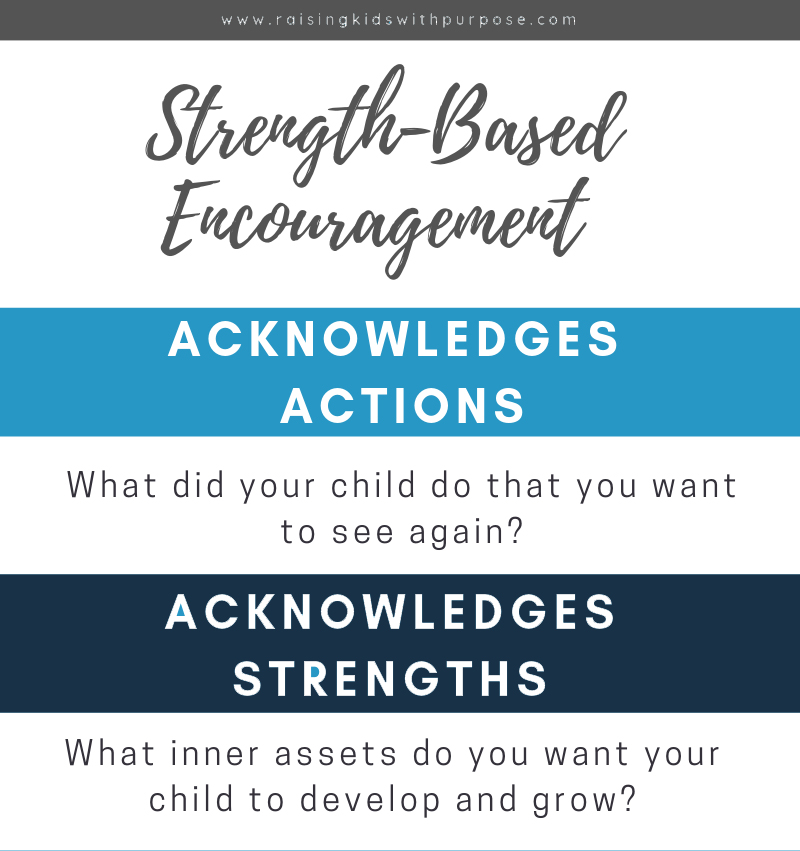
By making this small change of giving generic praise to both person and process, I’ve seen our kids take greater pride in what they do and repeat those behaviors like the research shows! Imagine that!
They are acknowledging what they need to make good choices and be good humans.
GOALS!
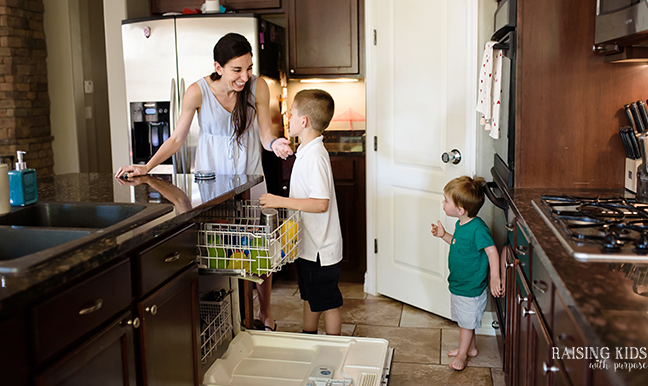
Put the Focus on What They Think
Something else I found in regards to praise was in The Me, Me, Me Epidemic: A Step-By-Step Guide to Raising Capable, Grateful Kids in an Over-Entitled World. by Amy McCready. Instead of keeping the focus on our opinion on what our kids do, flip it to see what they think.
Continuously giving approval and opinions can cause trust issues. It teaches kids to constantly look to others instead of relying on their own judgment.
This is especially true when the statement isn’t even true like telling your child who is awful at basketball that they are the best basketball player on the planet.
An easy way to do this is to ask a question like, “What do you think about the project you just created?”
A great time to do this is during a Family Meeting.
This has really helped our kids start to become proud of themselves. They no longer need to turn to us for approval for every single little thing.
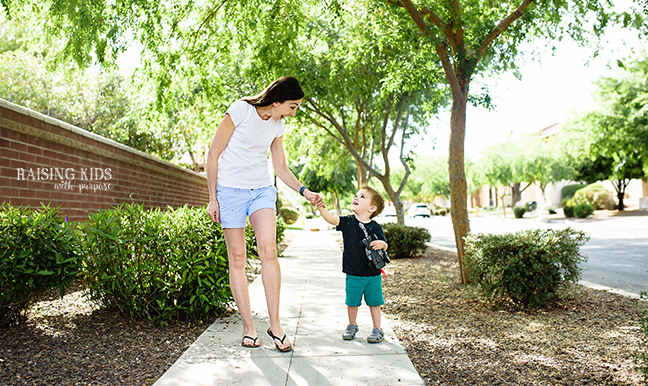
“We want our kids to learn to measure their behavior by their own standards. Learning to set their own standards and being the judge of their own behavior is what actually builds positive self-esteem – not shallow “you’re the best!” from another person.” – Amy McCready
Then they can grow into adults who don’t care about what others think (as much).
Become a Sportscaster
One of the easiest ways to make sure you are encouraging instead of giving empty praise is to repeat what they just did. You are acknowledging what they are doing without attaching any opinion to it which in turn, encourages them.
For example, recently, my husband told the kids “Good job” for eating their yogurt and granola. Shifting to encouragement would look like this, “Look! You are eating all of your yogurt and granola.” Then he could expand by adding
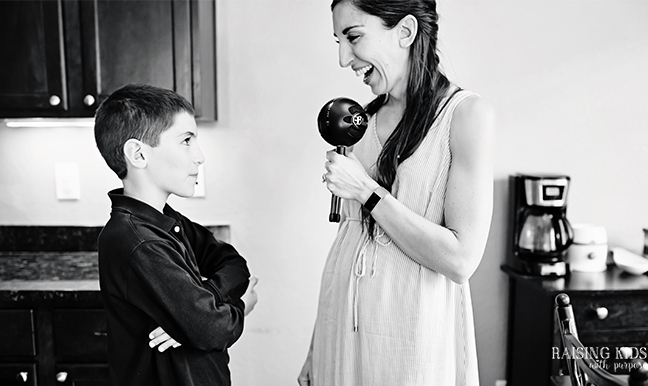
How to Make the Change from Praise to Encouragement
With all the information given above, here is a list of the practical things we can do to make the switch from praise to encouragement.
Focusing On Strengths and Process
- Point out the effort or process | You will help your child’s development far more if you give process praise with nothing else.
- Acknowledge the specific behavior you want to be repeated in the future and which of the strengths they used to do it |“Your attention to detail helped you organize and clean your bedroom.”
- Discover your child’s core character traits and strengths so they’re easy to point out during the moment | I made a printable to help you with this! See below.
- Avoid praising an innate area because they can’t control it | The research supports we should avoid praising these areas which include intelligence, appearance, athleticism, or creativity. Instead, point out areas where they do have control such as effort, attitude, responsibility, integrity, focus (unless they have attention deficits), perspective, compassion, respect, love, humility, etc. So instead of saying, “Wow you are so athletic”, praise how much effort they put in by practicing at home.
- Connect their behavior to how it affects others| Praise the process and effort in showing how it made their friend, sibling or you feel.
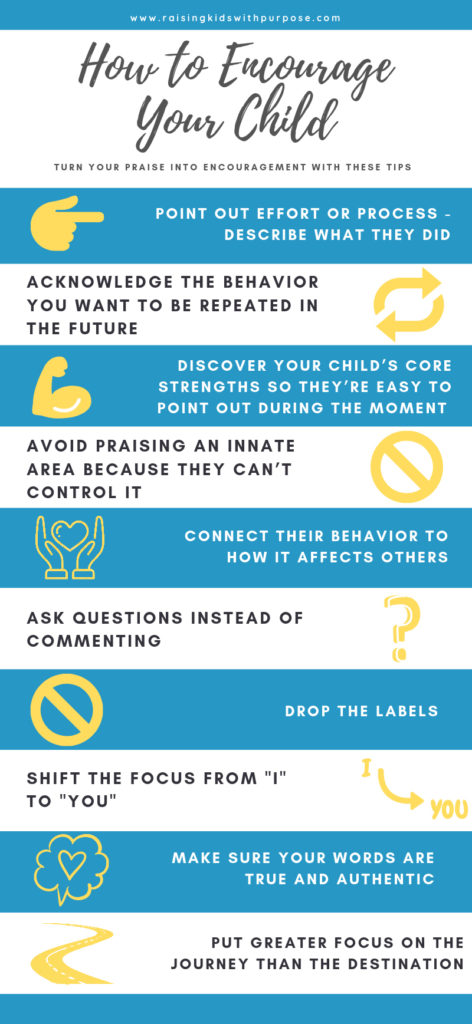
Other Tips to Make the Shift from Praise to Encouragement
- Eliminate the labels – It’s okay to point out the strength your child used to do a task but make sure it’s partnered with how they used that strength or trait.
- Describe the behavior – Become a sportscaster and “report” the action or behavior they just did.
- Ask questions – Instead of making a blank statement, ask how they can do the task or how they feel about the project.
- Be truthful and authentic – You can over-encourage by not being completely honest. Kids can sniff this out from a mile away.
- Shift the focus from “I” to “You” – Instead of, “I’m so proud of you.” Turn it into, “You must be so proud of yourself.”
- Put a greater focus on the journey than the destination – Instead of only celebrating the result such as the dance recital or playoff game, connect that to the behavior that helped them get there.
Is it clicking for you yet?
Free Printables!
On the spot, I have a difficult time remembering what I should be saying. What comes out of my mouth is anything but natural. At first, I sounded so awkward as if I were a robot repeating programmed phrases.
My kids looked at me like I was so weird …because I sounded so weird. And sometimes still do.
So to help you, I thought I’d provide some phrases that you can modify. Also, by writing down each of my boys’ strengths, it’s been easier for me to be more intentional in commending them in hopes they will repeat the behavior again.
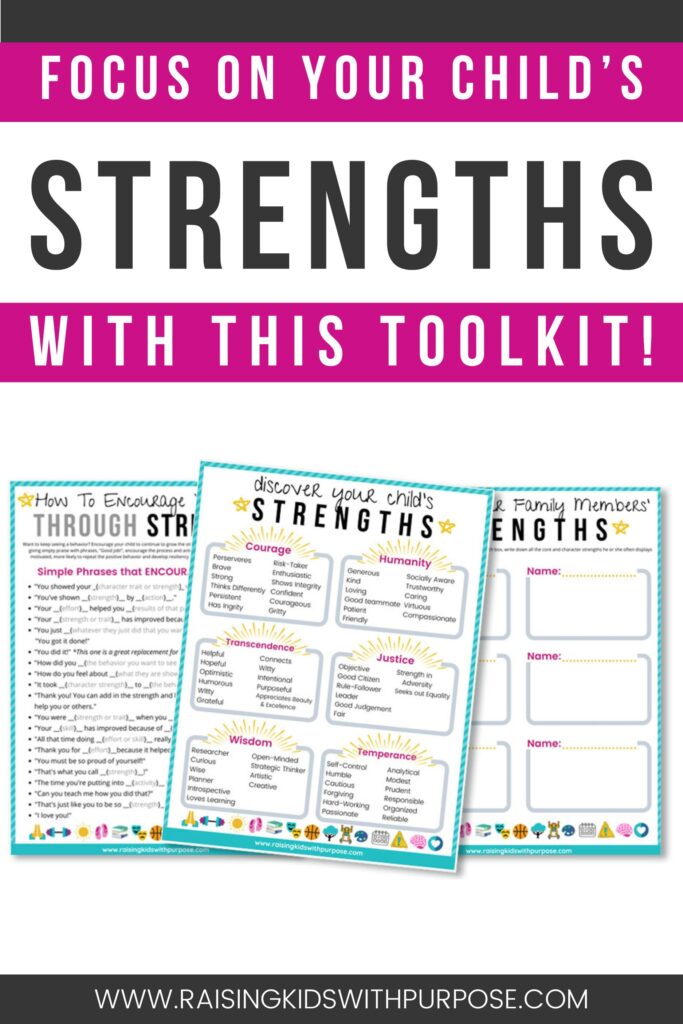
The Change We’ve Seen In Our Home
Once we started to make the switch from empty praise (and rewards), we have actually seen our kids become intrinsically motivated to help out without being nagged about it. Most of the time! And they’re excelling in certain areas far beyond expectations. Just like research shows!
One bonus result is that I’ve overheard my kids praising each other’s effort and encouraging their friends in ways that really make them feel good or want to repeat that behavior.
Now that deserves a little dance.
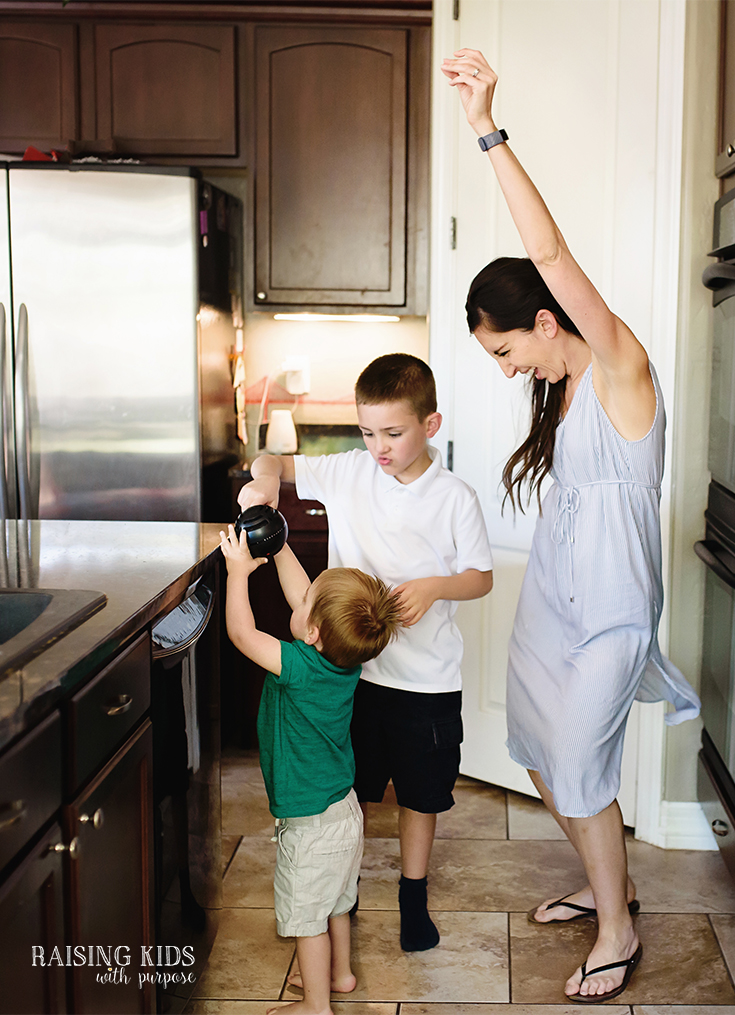
How Do You Encourage Your Child?
I would love to hear how you encourage your child!!!! Or what I can add to my repertoire. Comment below or email me at adriane@raisingkidswithpurpose.com.











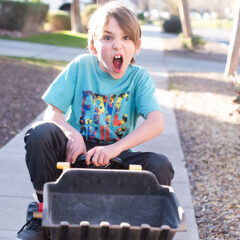
Andrea M Worley says
Love this! My husband and I were just talking about this the other day. it’s so hard to shift your mind but we’ve seen such improvement since we’ve been encouraging and not just praising our kiddos! thank you for the great article!
Adriane (Raising Kids With Purpose) says
Yes! Once you get in the habit, it comes as second nature. I’m almost finished reading “How to Raise An Adult” and she reiterates over and over again how we need to stop praising our kids and what it’s doing to them once they become adults and/or go off to college. Let me know how it’s going! *I just discovered how to reply to comments. LOL!
Laura says
I think that’s a really good strategy that you outline here. You can tell when adults are even dependent on others for praise. They’re always fishing for compliments and want you to acknowledge every little achievement that they do. It can be exhausting to be around. As children, we’re always looking for our parents’ approval, and not getting it at all can cause some damage. But as with all things, balance is key.
Adriane (Raising Kids With Purpose) says
Thanks! Yes, we didn’t even realize the damage we were doing. Now, our kids are so much more self-confident and appreciated!
Kim says
Great post. Just recently learned too much praise was not good. All about positive incouragament. Thank you for sharing.
Adriane (Raising Kids With Purpose) says
Yes! We didn’t even realize we were over-praising. You’re very welcome!
Kari says
This is such a great reminder! I try to tell my daughter that she’s “working so hard” at doing something and that she put in good effort! Its amazing what a tiny tweak can do!
Adriane (Raising Kids With Purpose) says
Right! I still struggle with not labeling but am working on thinking before I speak. It makes such a BIG difference!
Sonja - Too Much Character says
As a former elementary teacher, I love the specifics of your post and the links to other resources! It has been a several year process of attempting to untrain my brain to have the default be, “good job.” Instead I have been working on adding in observations and the “I noticed” statements. Thanks for sharing these ideas!
Adriane (Raising Kids With Purpose) says
Ooooh love the “I notice” statements. Totally stealing that. And yes, I’m constantly hearing teachers Good jobbing the kids like crazy! Or Little Gym tells parents to constantly give their toddlers lots of praise. The research is very clear and I have to say in my own house, the shift has been astounding!
Jen says
This honestly blew my mind a bit! I am a big praiser, so I will work on shifting focus like you described. Thanks for such a helpful article!
Adriane (Raising Kids With Purpose) says
really?? Yes, we were crazy over-praisers. And it’s really cool to watch how much more motivated our kids are now that we don’t give empty praise. We have found the research to be correct!